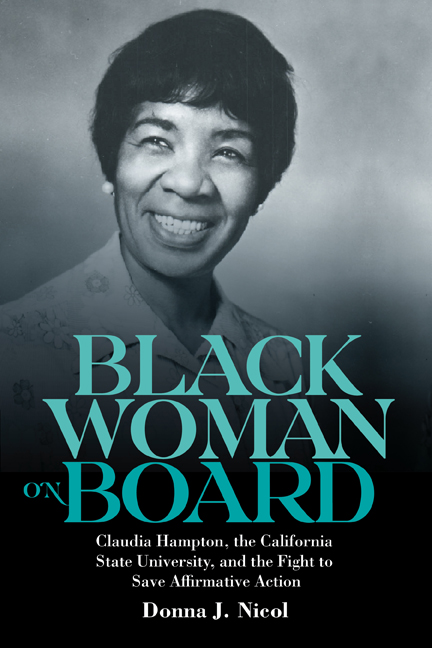 Black Woman on Board
Black Woman on Board Published online by Cambridge University Press: 09 May 2024
A Very Fortunate Happenstance
This book traces the history of affirmative action implementation and enforcement within the California State University (CSU) system to its end in California with the passage of Proposition 209 in 1996. It focuses on the black woman on the CSU board of trustees who fought for twenty years to enforce this positive law and prevent anti-affirmative action forces from eliminating these programs designed to increase access to the university for racial minority groups and women. The idea for this book came from a “very fortunate happenstance” while researching another project on a local grassroots organization started by my maternal grandmother called the Office for Black Community Development in Watts, California, in 1979. While searching through the CSU Dominguez Hills Digital Photo Archive, I stumbled across a photograph of a black woman standing at a podium in academic regalia at the 1976 commencement ceremony at CSU Dominguez Hills. The name was listed as Trustee Claudia Hampton but what intrigued me most about this photograph was a notation at the bottom of the picture with the words “appointed by Reagan.” Having written about Ronald Reagan for my doctoral dissertation on conservative philanthropy used to fund the academic culture wars of the 1990s, I knew that Reagan, when he served as the governor of California, had shown great contempt for the efforts made by African Americans to secure their civil rights. In fact, Reagan was a great admirer of Arkansas Governor Orval Faubus, who was at the center of efforts to block the enforcement of the 1954 Brown versus Board of Education decision. The two men shared a belief that school desegregation was a state's rights issue. Similarly, Reagan opposed the Civil Rights Act of 1964 and the Voting Rights Act of 1965, claiming the latter was “humiliating to the South.”2 He opposed the 1948 Supreme Court decision to overturn restrictive covenants in housing; signed the Mulford Act, aimed at disarming the Black Panthers, into law; and he condemned antiwar and civil rights activists as the “greatest threat to freedom and civility”—actions demonstrating hostility toward the peace and social justice advocacy work taken up by groups like the NAACP, Students for a Democratic Society, and the Black Panthers, among others. Imagine my surprise then at seeing a black woman being appointed by Reagan for any position within his administration.
To save this book to your Kindle, first ensure no-reply@cambridge.org is added to your Approved Personal Document E-mail List under your Personal Document Settings on the Manage Your Content and Devices page of your Amazon account. Then enter the ‘name’ part of your Kindle email address below. Find out more about saving to your Kindle.
Note you can select to save to either the @free.kindle.com or @kindle.com variations. ‘@free.kindle.com’ emails are free but can only be saved to your device when it is connected to wi-fi. ‘@kindle.com’ emails can be delivered even when you are not connected to wi-fi, but note that service fees apply.
Find out more about the Kindle Personal Document Service.
To save content items to your account, please confirm that you agree to abide by our usage policies. If this is the first time you use this feature, you will be asked to authorise Cambridge Core to connect with your account. Find out more about saving content to Dropbox.
To save content items to your account, please confirm that you agree to abide by our usage policies. If this is the first time you use this feature, you will be asked to authorise Cambridge Core to connect with your account. Find out more about saving content to Google Drive.